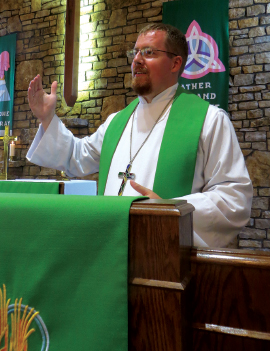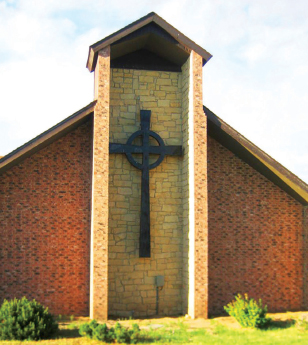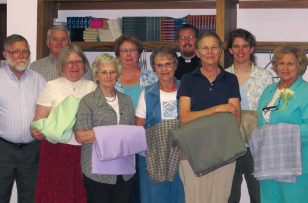
Concordia Seminary Newsroom
Life With and Without A Pastor

By Jackie Parker

Cindy Wittman, a longtime member of Grace Lutheran Church in Ulysses, Kan., remembers the Sunday morning when only two people were at a worship service: her and the church’s interim pastor.
Over the course of 15 years, Grace’s membership of 50-60 members dwindled to six or eight members most Sundays. But three years ago Rev. Patrick Gumz (’13) received a dual call to be the full-time pastor at Grace and at nearby Immanuel Lutheran Church in Lakin, Kan.
Now, about 20-25 people regularly attend Sunday services at Grace. Having a full-time pastor has helped bring stability to the congregation. “People acknowledge that we’re a church in town again,” Wittman said. “We exist.”
The experience at Wittman’s church with and without a pastor underscores the vital role a pastor plays in the life and health of a congregation. It also highlights the struggle by some congregations whose calls for pastors go unfilled because of a shortage of seminarians. This spring, about 30 pastoral calls received by Concordia Seminary, St. Louis and Concordia Theological Seminary, Fort Wayne, Ind., went unfilled because of a shortage of pastoral candidates.
“Then he said to his disciples, ‘The harvest is plentiful, but the laborers are few; therefore pray earnestly to the Lord of the harvest to send out laborers into his harvest’” (Matt. 9:37-38 ESV).
“It has become abundantly clear that the need for pastors is great,” said Rev. Wayne Knolhoff (’83), the Seminary’s former director of placement. “In each of the past two years we have had 30 congregations that have applied for but didn’t receive candidates. When that happens congregations can easily become discouraged because they are missing the spiritual leadership they so desperately want and need.”
Throughout The Lutheran Church—Missouri Synod (LCMS), there are about 400 pastoral vacancies. Another 400 are non-calling vacancies or congregations not actively seeking a pastor.
Seminary President Dr. Dale A. Meyer expects the number of unfilled calls to increase in the years ahead as more pastors reach retirement age. He encourages LCMS members and congregations to do what they can to encourage more young people to enter pastoral ministry.
“Jesus tells us to pray the Lord of the harvest to send laborers into the harvest. We can pray,” he said. “But we also can identify and encourage young men to enter the pastoral ministry.”
Welcoming a Shepherd
Wittman said she saw firsthand that without a full-time pastor, people drifted away from attending church regularly. She recently suffered a broken shoulder and welcomed a visit from Gumz. She wasn’t able to attend a few services in person, but thanks to Gumz, who posted services on the church’s website, she watched from home.
“With a pastor, you just feel looked after,” she said. “We were always close as a congregation because we always had each other. But now with Pastor Gumz and (his wife), Kami, we all are even closer.”

Rev. Patrick Gumz (’13) received a dual call three years ago to be the full-time pastor at Grace Lutheran Church in Ulysses, Kan., and at nearby Immanuel Lutheran Church in Lakin, Kan. Photo: Kami Gumz
Gumz’s other congregation, Immanuel, is about 28 miles north of Grace. When he was called to the remote corner of southwest Kansas where Grace and Immanuel are located, he said that people joked at his installation service, “You’ll either be here for three years or 30 years.”
Immanuel’s congregational President Stephen Gestenslager said the church was without a pastor for four or five years. The church did have an interim pastor part of the time until Gumz was called full-time.
“For a time, some of us thought that maybe we ought to go to another church that is an hour away,” Gestenslager said. “Without a pastor, it’s hard to have anyone to go to church with you. Not to have someone there, it makes you feel pretty doggone lonesome and left out in the cold. There are things you don’t talk to with anyone else. That’s what I missed the most about not having a pastor.”
Immanuel’s members happily welcomed Gumz full-time. They appreciate the stability and spiritual leadership he has returned to the church.
“He can recite anything from the Bible,” Gestenslager said. “He’s down to earth and can relate to anyone.”
Wittman added: “Rev. Gumz always listens and is able to relate, even though he’s so much younger than us. We’re all seniors!”
‘A presence in the community’
Like at Grace and Immanuel, members of St. Paul’s Lutheran Church–College Hill, in the inner-city of St. Louis, know what life without a full-time pastor is like. The church went without a full-time pastor for 15 years, until Rev. James Kirschenmann (’16) was called there this spring from Concordia Seminary. He also has been called to serve nearby Immanuel Lutheran Chapel in north St. Louis County as part of a dual parish arrangement.
Fifth-generation church member and neighborhood resident Teri Rose said the congregation has always been blessed with a strong lay leadership and that helped keep the day-to-day operation of the church going despite the absence of a full-time pastor.
“Ours is a tough ministry,” Rose said. “In the community, residents deal with mental health issues, as well as alcohol and substance abuse. It’s not an easy mission. People who don’t live here have an irrational fear of the neighborhood.”
“There are things you don’t talk to with anyone else. That’s what I missed the most about not having a pastor.”
— Stephen Gestenslager
She said that oftentimes when members moved away, they chose to attend other churches, believing the neighborhood
had gotten too dangerous. During the church’s anniversary last year, about 40 former members who live outside the neighborhood pledged to come back to the church. That number has dwindled to two. One person who returned to St. Paul’s as a member lives in Pacific, Mo., about 40 miles from the church.
“The ones who are coming from outside the neighborhood are the real stalwarts,” said Kirschenmann, who served his field work at St. Paul’s from 2013-2015 and a vicarage from 2015-16. Now pastor, he and his wife, Katherine, live in the parsonage next door to the church.
Kirschenmann said the main challenges at the church are that the congregation has lost track of what a pastor does and the need for partnership churches. He recalled finding out weeks after the fact about a death in the church family and a hospitalization.

“They’re used to thinking that they’ve got no one to call, so they don’t,” he said. “I’m here now, so they can let me know what’s going on so I can do ministry. It’s taken about a year to get to the point to where they let me know about these kinds of things.”
As for partnership churches, Kirschenmann said that there are three St. Louis-area churches that now “walk alongside of us”: St. John’s Lutheran Church, Ellisville, Mo.; St. Paul’s Lutheran Church, Des Peres, Mo.; and Abiding Savior Lutheran Church, St. Louis.
The church partners maintain relationships with Bryan Hill Elementary School, a St. Louis public school that shares the same city block with St. Paul’s. They also send volunteers to the church to help keep up with repairs. About 40 people attended a work day last April.
The support of other LCMS churches has strengthened St. Paul’s, Kirschenmann said. “Having these churches involved has made a big difference in their hope,” he said. “They can think beyond these walls and understand that they are connected to the greater Synod at large.”
‘We can be the church’
In Kansas, consistency is something Gumz’s new churches desperately craved before he came. At Grace, his challenge was changing the congregation’s culture from that of a dying church to “we can be the church” regardless of size.
During Lent, Grace holds an annual “Give up a blanket for Lent” collection. About 300 blankets are donated and given to Orphan Grain Train, a Christian volunteer network. Because of the success of the blanket campaign, congregational members have now added an “Underwear for Christmas” campaign in which they collect toothbrushes, stuffed toys and underwear during Advent and Christmas for people in need. Grace members also distribute school supplies to teachers at the start of the school year.
The church’s changed outlook is a step in the right direction. “We can do good in our community,” Gumz said, “even when we’re small, even if there are only six of us.”
Wittman said that with Gumz in place, the congregation is also gaining more visibility in the community. The congregation went years without a Bible class, but it has one again. It has even offered a world religion class and invited the entire community to attend. The church’s commitment to the local food bank has expanded. Wittman said church members volunteer two weeks every month and now with new members, they are looking to expand that role.
Grace recently gained an even younger member. Gumz and his wife adopted Joseph, age 4. Wittman is part of the church committee that recently hosted a shower for the new family.
“There’s a difference between someone who is there temporarily and one who is there for the long haul,” Gumz said. “I’m the shepherd actually living with the flock and they recognize the difference.”

Grace Lutheran Church in Ulysses, Kan., now has a full-time pastor in Rev. Patrick Gumz, who has helped bring stability back to the congregation. Photo: Courtesy of Grace Lutheran Church.

During Lent, Grace holds an annual “Give up a blanket for Lent” collection. About 300
blankets are donated and given to Orphan Grain Train, a Christian volunteer network. The drive has been so successful that now church members have added an “Underwear for Christmas” campaign in which they collect toothbrushes, stuffed toys and underwear during Advent and Christmas for people in need. Photo: Courtesy of Cindy Wittman
“It has become abundantly clear that the need for pastors is great.”
— Rev. Wayne Knolhoff (’83)